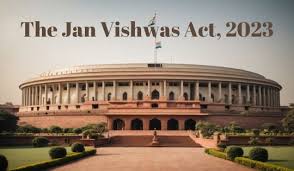(No. 32 of 2023)

Introduction: The Mediation Act of 2023 received the assent of the President and was notified in the Gazette of India on 15th September 2023. The Mediation Bill was first introduced in the Rajya Sabha on 20th December 2021. After that, it was referred to a Parliamentary Standing Committee for discussion. The final report by the Committee was submitted on 13th July 2022. On the last leg of its legislative journey, it was passed by the Lok Sabha on 7th August 2023. The Act contains 65 sections and 10 schedules.
Object: It is an Act to promote and facilitate mediation, especially institutional mediation, for resolution of commercial or other disputes through Alternative Dispute Resolution (ADR) lawyers including arbitration lawyers and legal experts. It will enforce mediated settlement agreements, provide for a body for registration of mediators, arbitrators and ADR lawyers and experts, to encourage community mediation and to make online mediation as acceptable and cost effective as possible.
Implications: The Act is first of its kind in the field of Mediation and Alternative Dispute Resolution (ADR) laws in India. Our team of arbitration lawyers and ADR experts are of the opinion that the said Act will significantly streamline the process of dispute resolution law and bring down the number of litigations. The Act will also be an attractive resolution mechanism for disputants looking for an adaptable and cooperative way out of their dispute.
Applicability:
The Act will apply to disputes between: –
- Habitual resident of India; Incorporated in India or having place of business in India,
- If mediation agreement provides disputes to be resolved under this Act,
- International mediation,
- One of the parties is Central Government/State Government or entities controlled by such Government, Commercial disputes,
- Parties as per notifications of Central Government from time to time
Jurisdiction:
Under the Act, mediation shall be undertaken the territorial jurisdiction of court/tribunal of competent jurisdiction to decide the subject matter of the dispute. The proceedings can be conducted online or in a place outside of such jurisdiction, which shall be considered to be undertaken within the territorial jurisdiction for the purpose of enforcement, challenge and registration of the mediated settlement agreement.
Mediation Agreement:
Every mediation agreement must be in writing and parties must submit their dispute to mediation. Similar to the arbitration clause under the Arbitration and Reconciliation Act 1996, the mediation agreement can be drafted as a “mediation clause” within an agreement or a special agreement pertaining only to mediation.
The Act shall consider an agreement to be in writing if it is:
- Executed as a document between the parties;
- Contained in a form of communication, electronic or otherwise;
- Where one part alleges existence of such clause/agreement and the same is not denied by the other party
- Any reference in any agreement containing a mediation clause.
Pre-Litigation Mediation:
This provision can be credited to the Standing Committee as it was not a part of the original Mediation Bill 2021. Regardless of executing a mediation agreement before any disputes have arisen, parties are permitted to mutually refer their dispute to mediation before pursuing litigation. Therefore, it is an optional pre-litigation mediation for parties looking to avoid costs.
However, pre-litigation mediation can be conducted only by a mediator: –
- Registered with the Council; or
- Empaneled by court-annexed mediation centre;
- or by Legal Services Authorities Act 1987;
- or by a mediation service provider under this Act
Appointment of Mediators:
The parties are free to choose a mediator and procedure for the same on their own, as it upholds and encourages party autonomy. The Act does not specify any qualifications for being appointed as a mediator. In case of failure to reach an agreement between parties, then the party seeking mediation can apply to a mediation service provider for appointment of a mediator. A mediator shall be appointed within 7 days of such application with the consent of the parties and mediator. As a last resort, a mediator from the panel maintained by the service provider shall be appointed with his consent.
Time Limit for Proceedings:
The Act provides to complete the mediation process within 120 days which may be extended to a further maximum period of 60 days.
Mediated Settlement Agreement:
After the conclusion of the mediation proceedings, the Mediated Settlement Agreement is drafted and signed by the parties. After authentication by the mediator, it becomes enforceable in the same manner as a judgment or decree of the court with the provisions of the Code of Civil Procedure, 1908. The terms of such an agreement may extend beyond the disputes referred to mediation.
Grounds for Challenge of Settlement Agreement:
This agreement may be challenged in some cases of
- fraud,
- corruption,
- impersonation,
- and where the dispute was not fit for mediation, etc. This agreement is generally a confidential agreement.
An application for challenging the mediated settlement agreement must be filed within 90 days from the date on which the party making that application has received the copy of mediated settlement agreement.
Online and Community Mediation:
It also provides for online mediation as well in order to eliminate the geographical barriers for the parties but the parties must to keep it confidential. The act provides for mediation by use of electronic form or computer networks but not limited to an encrypted electronic mail service, secure chat room or conferencing by video or audio with the mutual consent of the parties to such dispute.
Further, the concept of community mediation is put forward by the Act to resolve disputes that affect peace, harmony and tranquility of any area with prior mutual consent of the parties.
Confidentiality:
The act provides for maintaining the confidentiality by the mediator, mediation service provider, the parties and the participants in the mediation of the following:
- the mediation proceedings,
- acceptance or willingness to accept proposals,
- documents prepared for the conduct of mediation,
- the information related to the mediator,
- and the subject matter of the mediation conducted.
Mediation Council of India:
The Act provides for establishment of the Mediation Council of India at New Delhi or any other places as per the Central Government. The composition of the Council will be:
- Chairperson- Person with knowledge and professional experience relating to ADR or law.
- Member- Eminent person with experience in research or teaching mediation or ADR laws.
- Member- Person with knowledge and professional experience relating to ADR or law.
- Ex officio Member- Secretary to Government of India in Deptt. of Legal Affairs, Ministry of Law and Justice or their representative.
- Ex officio Member- Secretary to Government of India in Deptt. of Expenditure, Ministry of Finance or their representative.
- Part Time Member- Representative of recognized body of commerce and industry chosen by Central Government.
The terms of office for the members, grounds for their removal are also illustrated in detail. The Council shall endeavor to promote domestic and international mediation and lay down guidelines for education of mediators.
Conclusion: To summarize, the Act is a pioneering legislation that will transform and institutionalize the practice of mediation as part of Alternative Dispute Resolution (ADR) in India. Many provisions of the Act replicate parts of the Arbitration and Reconciliation Act 1996, a major player in the field of Alternative Dispute Resolution. The Act remains silent on the concept of interim relief, which can be considered to be an anomaly. It is expected to remarkably diminish litigation and facilitate the growth of mediators practicing in India.
By: Roopan Atwal, Advocate





